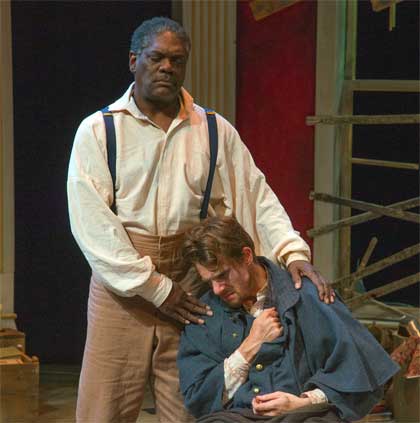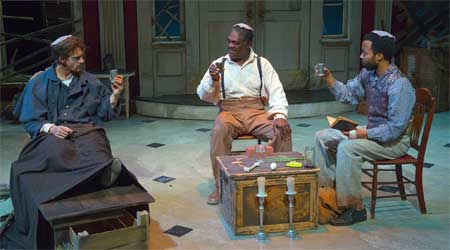Play (2006)
by Matthew Lopez
Directed by Benny Sato Ambush
New Repertory Theatre
Arsenal Center for the Arts
Watertown, MA
January 25 – February 15, 2014
With Johnny Lee Davenport (Simon), Jesse Hinson (Caleb), Keith Mascoll (John)

Jesse Hinson as Caleb
in “The Whipping Man”
Photo: Andrew Brilliant / Brilliant Pictures
Courtesy of New Repertory Theatre
Caleb, a Jewish Confederate soldier, returns to his home in the South, wounded from the Civil War, and encounters Simon and John, two of his family’s slaves.
It is an interesting idea, indeed, though by no means novel – bringing together Judaism, a religion whose fundamental scripture is largely based on the idea of escape from slavery in ancient Egypt, and the enslavement of African-Americans in the southern United States during the Civil War era. By using the device of a Jewish Civil War veteran from the South, playwright Lopez raises the ante on this relationship, making it personal and potentially vivid, in which it succeeds to some degree.
After the opening, which I thought was quite powerful, I had trouble, however, getting beyond the feeling that the playwright had manufactured a drama out of the fact that some small percentage of Southern whites during the era of enslavement were Jewish. He adds the curiosity that the slaves in the household also became Jews and it is indeed a rare and interesting scene which depicts Caleb, Simon and John sharing a makeshift Passover seder.

Johnny Lee Davenport as Simon
Keith Mascoll as John
in “The Whipping Man”
Photo: Andrew Brilliant / Brilliant Pictures
Courtesy of New Repertory Theatre
But there is a lot of strange and not very satisfying implication in the narrative. That Caleb, the son of the owners, has taken an energetic part in the management of the slaves, along with the most severe of the unhappily entailed roles – consider the play’s title – is a vivid indictment that has odd implications when the subject is a small Jewish minority of slave owners in the South.
Whereas the brilliant film 12 Years A Slave (2013) felt like a vivid, just and honest depiction of the varied, sometimes horribly brutal, dimensions of slavery, The Whipping Man, because of the more explicitly focused, but not particularly justified, cultural indictment, began to feel like an architected oddity, not honest and vivid, but melodramatic and concocted.
It did not surprise me to learn that playwright Lopez, apparently a non-Jewish Hispanic from Miami, wrote this at the tender age of twenty-five. It feels like a young person’s play – ingenious in idea, but plodding in execution.
As Simon, the elder of the two slaves who remain, Johnny Lee Davenport delivers a powerful performance. His deep and resonant voice and his power to command a sense of seriousness and conscience carries the weight of the show.
The turns of the story are intense, but feel constructed, and, ultimately, the strength of Simon’s demeanor, so beautifully rendered by Davenport, gets challenged by one of these narrative turns.
Keith Mascoll’s John, the younger slave, has an odd presentation – cocky and offhand at first, then enraged, his persona a duality that does not, in the end, make sense.
Jesse Hinson does an okay job as Caleb, though there is not any hint of Jewishness in his persona. There is also nothing in the narrative to suggest anything distinctive about Caleb’s Jewish attitudes or beliefs, and Hinson’s culturally generic Caleb might as well be any Confederate soldier returning home. So what is the idea of making him Jewish? It seems that the playwright had an idea that he wanted to execute, but did not think too deeply about the characters, attitudes or distinctive cultural contexts that might embody those ideas.
Overall, the production does a reasonable job of bringing out the dramatic contours, but it is Johnny Lee Davenport’s interpretation of Simon which is the standout. Seeing his performance and feeling its gravitas is the main reason to see this performance of this play, based on a curious idea, but ultimately unrealized in its narrative development.
– BADMan
Leave a Reply